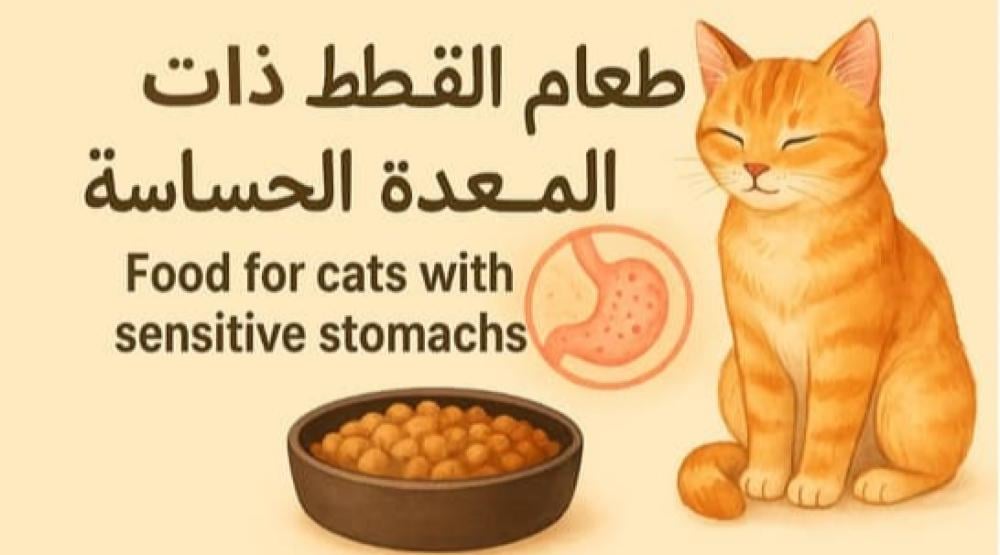Does your cat suddenly appear silently next to you as soon as you carry food?
Does her selective hearing turn into super-hearing the moment you open her favorite food bag?
Cats love to eat—but when they start showing signs of a sensitive stomach, it's time to rethink what you're feeding them.
Unfortunately, sensitive stomachs are quite common in cats, and while there are multiple causes, the most common trigger is often the food ingredients themselves—such as grains, fillers, or artificial additives.
In this article, we explore the signs that your cat might have a sensitive stomach, the potential causes, and how to help them by offering fresh, easy-to-digest food.
What is Cat Food for Sensitive Stomachs?
It’s food made with easy-to-digest ingredients, high in protein, low in carbohydrates, and completely free from grains, fillers, or animal by-products.
Cats are natural carnivores, and their bodies are equipped with enzymes to digest real meat—this is what they truly need in their diet.
At Trappy Bites, we offer fresh food made from real, human-grade meat, gently cooked and grain-free, rich in essential nutrients and easy on sensitive stomachs.
Signs Your Cat Has a Sensitive Stomach
- Frequent vomiting
- Diarrhea
- Loss of appetite
- Lethargy or excessive sleeping
- Excessive lip licking (often a sign of nausea)
Why Does My Cat Have a Sensitive Stomach?
There are several possible causes of stomach sensitivity in cats, including:
- 1. Low-Quality Commercial Food Many processed foods contain corn, soy, wheat, and other fillers that may trigger allergies or intolerances.
- 2. Sudden Change in Diet :If your cat is used to one type of food and it’s changed abruptly, it can disrupt the healthy gut bacteria.
- 3. High-Fat Diet: Excess fat may upset the digestive system. It’s best to choose lean, easily digestible animal proteins.
- 4. Stress or Anxiety: Moving to a new home, introducing a new person or pet, or prolonged separation can impact digestion due to emotional stress.
- 5. Eating Inappropriate Items: Cats may eat bugs, plant leaves, or human food that can irritate the stomach.
Is It a Food Allergy or Food Intolerance?
Allergy and intolerance are different.
- Food intolerance happens when the cat lacks the enzymes to digest certain ingredients like lactose, gluten, or plant proteins. This is the most common cause of stomach sensitivity.
- Food allergy is an immune system reaction to a specific ingredient. If in doubt, consult a vet for allergy testing.
What Causes Food Intolerance in Cats?
Food intolerance can develop over time. A common example is lactose intolerance—it doesn’t usually affect kittens, but it causes problems in adult cats.
Other triggers include:
- Chronic illnesses: such as IBD (Inflammatory Bowel Disease), hyperthyroidism, pancreatic issues, or even cancer.
- Parasites or infections: untreated infections may lead to long-term digestive issues.
- Pregnancy: pregnant cats may experience dietary shifts and develop new sensitivities.
- Stress: moving homes, trauma, or fights with other animals can lead to digestive upset.
Best Food for Cats with Sensitive Stomachs
If your cat shows signs of stomach sensitivity, start by switching to a high-quality diet. Avoid food that contains grains, fillers, or artificial additives.
The best type of food is one that’s rich in real animal protein, mimicking the nutritional value cats get in the wild. This type is naturally more digestible and suitable for sensitive stomachs.
At Trappy Bites, we offer fresh, gently cooked meals—
- Delivered frozen to maintain freshness
- Grain-free
- Packed with real protein
- The ideal choice for cats with sensitive tummies
Benefits of Our Fresh Cat Food Include:
- Easier digestion
- Increased energy and activity
- Shinier, thicker coat
- Fewer hairballs
- Healthy weight maintenance
Is Fresh Food the Best for Cats with Sensitive Stomachs?
Yes, fresh food is the best option. It contains high-quality proteins that help with hydration and better nutrient absorption.
It also protects against dehydration, especially if the cat is experiencing vomiting or diarrhea.
However, if your cat has a specific medical condition, it’s always best to consult a vet to ensure the food suits her needs.

